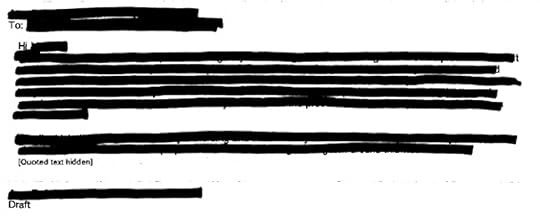When Silence Encircles Silence: Super-injunctions and Religion

In English law an injunction functions as a prohibition that prevents journalists from talking about a certain issue. A super-injunction is a prohibition that prevents journalists from talking about the fact that there is a prohibition. Not only can something not be talked about, but you cannot talk about the fact that there is something you can’t talk about.
Within various ideological systems we see forms of super-injunction take place. We can imagine, for instance, a religious community that doesn’t admit to its questions, doubts and disbelief. If someone brings up underlying doubts they can themselves ostracised by the wider community. However the prohibition against raising doubts is itself hidden behind a second-level prohibition that stops anyone naming this crime against orthodoxy. If someone where to stand up and warn people that they were not allowed to question the doctrine of the church, express doubts, or think freely, that individual would likely find themselves just as ostracised as the one who openly raised questions. The first breaks an injunction while the second breaks a super-injunction.
For the prohibition to remain effective it must operate in secret.
Not a secret that hidden from everyone, rather a secret that almost everyone knows but have conspired to keep hidden.
A perfect expression of this can be seen in a political act that Slavoj Žižek and some others engaged in as students in Yugoslavia. At the time the Communist Party always won the elections because they were fixed. At first the students considered exposing the truth that everything was rigged. But they realized that almost everyone already knew this. It was a secret knowledge that people knew but never talked about. So instead they pretended to engage in an act of pure naivety and treat the elections as if they were free.
With this in mind they used their student journal to publish a special edition on the eve of the elections. In the journal they wrote about how everything was to play for in the political arena, how no one could possibly predict the results, and claiming that it looked as if the Communist Party might actually win. This act made a mockery of the political process by overly identifying with it. By believing the official story they undermined for the simple reason that the satire would make people laugh and encourage them to actually name the secret knowledge that remained unspoken.
When the students were brought before the Central Committee, they acted completely ignorant and asked, “what did we do wrong?” After all, the Central Committee held that this was a free election, and the students were agreeing with that. The problem for the officer interrogating them was that he was unable to actually spell out what they had done wrong. Not only was democracy prohibited, but no-one was able to actually speak about how democracy was prohibited – including those in the Central Committee.
Often a political act involves naming the hidden prohibitions that would embarrass and undermine the ideological system in question. For example, in some religious communities there is both a silence around issues concerning sex and sexuality and a silence encircling this silence. Not only can you not speak about sex and sexuality outside what is considered normal, you can’t even talk about how you can’t talk about it. The first step thus involves finding creative ways to expose the super-injunction for all to see.
Peter Rollins's Blog
- Peter Rollins's profile
- 314 followers



